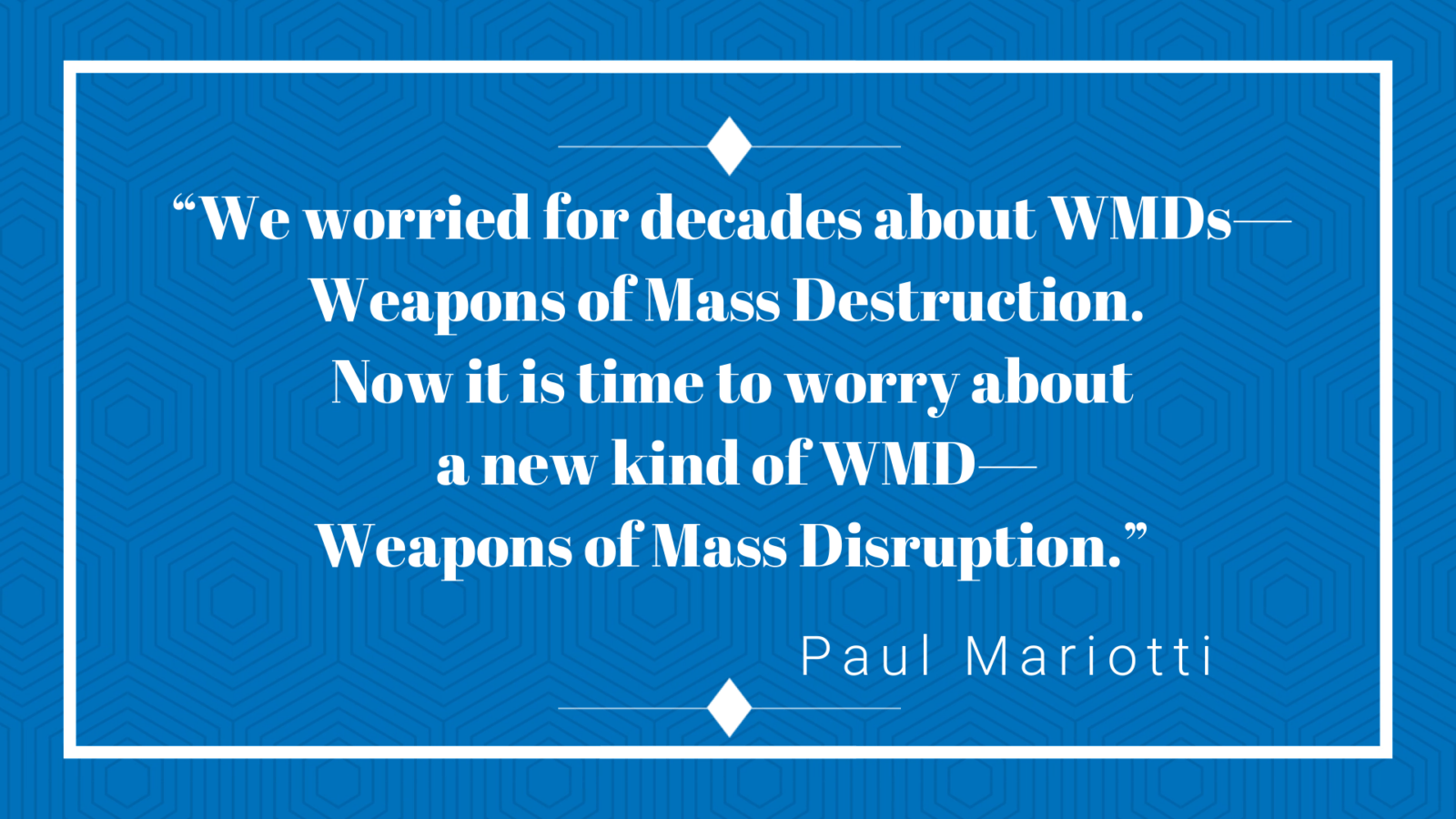IT’S A MAD, MAD HACKER’S WORLD
by Jeemes Akers
“Corporate secrets bouncing around a computer system that’s open to the world? Hey, that’s fair game and they deserve the embarrassment of its discovery. But using this knowledge to line your pockets or, worse, using insider knowledge to get the information and then calling that hacking is an affront to any of us who hack for the sake of learning.”
Emmanuel Goldstein
“We worried for decades about WMDs—Weapons of Mass Destruction. Now it is time to worry about a new kind of WMDs—Weapons of Mass Disruption.”
John Mariotti
“Never underestimate the determination of a kid who is time-rich and cash-poor.”
Cory Doctorow
It is a far different world than the one in which I grew up.
For one thing we never heard of ransomware; “in a ransomware attack, hackers get into a computer network and threaten to cause disruption or delete files unless a ransom is paid.”[1]
Indeed, it is rapidly becoming a hacker’s world.
Just take the morning headlines earlier this week (June 2, 2021): “JBS: Cyber-attack hits world’s largest meat supplier” (BBC News), “Russia-linked cyberattack on JBS Meats hits 10,000 jobs (Newsweek),[2] and, “Go To The Stores And Stock-Up Now Because Things Are About To Get Really Crazy,” (The Economic Collapse).[3] The attacks on JBS SA—the Brazil based company that is the world’s largest meat producer—upended meat supplies and prompted mass lay-offs this week. Who was responsible? The White House pointed its finger at Moscow and the FBI attributed the attack to REvil, a criminal ransomware gang operating with impunity in Russia.[4]
More recently, there have been cyberattacks on transportation systems in New York and Massachusetts. Indeed, a dangerous, professional-scale hack-for-ransom threat is spreading rapidly, targeting companies, schools, hospitals and other institutions.[5]
These largescale ransomware attacks are occurring with increasing frequency. Just last month, Imogene and I were among large numbers of car drivers in the Washington D.C. area cuing up in long lines at the gas pumps—even as many stations ran out of gas completely because of panic buying—in the aftermath of a ransomware hacking attack that shut down the main pipeline on the East Coast. A criminal hacking group Darkside (believed to be in Russia) shut down the system until Colonial Pipeline secretly handed over a hefty $4.4 million ransom payment.[6] Congressional hearings into the payment—and the national gas crisis the incident caused—are due to begin June 9. According to one congresswoman: “Colonial’s hasty decision sets a dangerous precedent and puts an even bigger target on the back of critical infrastructure.”[7]
Colonial and JBS are hardly alone. In 2020, there was $348 million in known ransomware payments (four times the amount paid in 2019), making it the fastest-growing category of cryptocurrency payments.[8] Why is this happening? “Hackers have grown adept at communicating about vulnerabilities on the so-called Dark Web, a network of computers that can share information anonymously. The ability to demand payment in cryptocurrency limits law-enforcement tracking abilities. And the growth in insurance policies that cover ransomware payments has helped seed an increasingly professionalized ransomware industry.”[9]
Who takes the added costs and inconveniences in the neck? Average consumers, of course.
“Sigh.”
Like I said: it is a different world.
All these recent ransomware attacks make me wonder about the future of hacking.
Will hackers be a threat for the foreseeable future?
And beyond?
I attempted to address that issue (and the future of algorithms) a couple years ago in a short science fiction story. In the story, I accidentally stumble through a time portal and end up in the year 2050. This is a small section from that piece:
“Suddenly, soundlessly, above me gathered a swarm of hundreds of tiny drones, with their lights flashing in a coordinated, rhythmic pattern. I watched, too awe-struck to be scared at what I was seeing. After a few moments, and not being able to figure out what the drones were doing, I stood up to continue my walk. In unison, the drones formed a wall directly in front of me to prevent me from moving forward. When I turned around to retreat, they instantaneously formed a barrier to prevent me from moving in that direction.
So, I stayed put and sat back down.
This awkward silence and stand-off lasted for what seemed to be fifteen minutes or so. Then, I heard something crashing through the trees in front of me. At the same time, the drones forming the swarm-barrier separated and ascended into the sky high above me. Strobe-like lights flashed across the enclosure in front of me and the area where I was sitting in the grass was suddenly illuminated by a bright-white, incandescent brightness.
Inside, I began to pray fervently.
Psalms 91, my favorite go-to in time of trouble.
I was beginning to wish I had opted for a trip to Chic-fil-A.
A mechanical vehicle, riding a chassis on tank-like treads, noisily lumbered straight toward me. It stopped about ten feet in front of me. A figure in uniform, wearing a futuristic-looking helmet, climbed down out of the cockpit-looking part of the vehicle. The figure carried what I assumed to be a weapon of some sort and leveled the device in my direction as it approached me. The figure’s movements seemed almost robotic.
The figure snapped a couple latches and took off the helmet. The face appeared to be that of a human.
“Do you speak English?” asked the voice with an almost computer-generated, masculine but Siri-like sound.
“Yes,” I mumbled.
“What are you doing here?”
I scratched my head in puzzlement. “I’m not sure.”
“Do you have a Code number?”
“No.”
“So how did you get here?”
I tried my best reassuring and non-threatening smile. “I was just walking through the woods and …”
All of a sudden there was another voice from the vehicle. “Relax 327. He poses no threat.” The sentry-type figure called 327 retreated, keeping a wary eye on me and continuing to point the laser-type device squarely at my chest.
The other individual approached me. I couldn’t decide whether the figure was a male or female and the soft voice didn’t help me out.
“Sorry,” they said, “we rarely get visitors in this sector.”
“I meant no harm,” I said apologetically.
“I understand,” they said, “but I do need to ask a couple questions.”
I nodded.
“Since you have no Code identifier, you must have accidently stumbled into one of our portals. That is most unusual. Where did you find it?”
“The portal?”
“Yes.”
“Close to my house in Sterling, Virginia …”
“Sterling?” The figure pulled off a wrist device that looked like an organic bracelet and placed it against their temple. After a moment or two, they looked at the nearby sentry.
“Looks like another hacker’s attack,” the figure said.
Turning back to me, the figure said, “let me apologize. The coordinates we entered for the portal’s gateway were intended for Fort Detrick, Maryland. Seems like someone hacked into our equipment. What is your name?”
“Jeemes. And yours?”
The figure chuckled. “We have no names here, but only Code designators. I am called 420.”
“420?”
“Yes, 420 million lines of Code.”
I tried to soak in the meaning of that. “So the portal wasn’t intended for me,” I said with a sigh, “for a moment I thought God had led me …”
At the mention of the word God, Sentry 327 re-shouldered the laser threateningly and the swarm overhead glowed beet-red.
In response, 420 suddenly raised its hands as if to reassure them. “Stand down!” 420 said authoritatively. “He is from another place and time and unfamiliar with our laws.”
Then 420 looked directly at me. “DaShou has outlawed the use of that word in our world.”
“DaShou?”
“Ah yes, you must have come through the portal before the Great Conflict. DaShou is our global brain, who gave us the answers to stopping the war, ending the economic collapse and curing the global pandemic. DaShou has ubiquitous connectivity to virtually everything and everybody. DaShou is pure algorithmic Code.”
“You mean nobody believes in the Lord on this side of the portal?”
420 paused, and I sensed it was choosing a careful response.
“The short answer is no. DaShou renders decisions based on mathematical algorithms. We are free from the uncertain morality standards that plagued the leaders of your world. But since you are an outsider who doesn’t know any better, I assume there is no harm in telling you there are unverified rumors of what some call a remnant of old-time believers who continue to hold out …”
“Perhaps you had better take me back to the portal then,” I said, “and let me return to my world.”
“Oh, believe me, I would if I could, sir,” 420 said, “but the portal is closed. And I’m afraid none of us have been trained or programmed for this type of situation. On your side, what year did you enter the gateway?”
“2025.”
420, with fists clenched in disgust, blurted out “damned hackers.”
“So, what year is it here?”
“2050.”
It took a while for the information to sink in. I felt a strange disorienting gnaw claw inside my stomach, like something bad was about to happen. “You mean you still have problems with hackers in 2050?”
420 paced back and forth, seemingly deep in thought. “Yes, we certainly do. You know, Skera’s Corollary and all that …”
“What’s that?” I asked.
“Surely, even in your world you were familiar with Moore’s Law.”
“Yes, the ideas that lay a baseline of sorts for exponential cyber growth.”
“I’m impressed,” 420 said, “what was less generally known in … what was it 2025? … is that for every thousand lines of Code, there are 20 to 30 malwarts—I think you called them “bugs”—or for every fifty million lines of Code there are at least one million potential coding errors to be exploited. Since the programing for the portal device requires almost twenty trillion lines of Code … well, you can see the enormity of the problem.”
“But I would assume that by 2050,” I said, “that most of the Code would be written by self-replicating robots, using quantum computing and most of the “bugs” eliminated?”
“Indeed, there has been substantial progress. Yet for some reason the corollary still stands. It remains a perplexing problem for our Code engineers.”
“And DaShou?”
“DaShou is Code,” 420 snapped, “DaShou doesn’t write Code and contains no mistakes.”
I decided to switch topics. “Can you tell me for whom, or what, was the portal opening intended at Fort Detrick?”
“A young biogeneticist named Sylvia Black. We had a basic orientation and training tour set up for her, based on our own mathematical calculations of her future importance.”
“I see,” I said.
“I don’t suppose you—being a Christian and all—would be interested to take her place?”
“What is my other option?”
“327 and I take you back to a containment center until my bosses figure out what to do with you?”
“Then consider me a happy candidate for the orientation tour, “I said with a grin
“Good,” 420 replied, “that will save me Code lines of bureaucratic trouble.
I noticed 327 relax its grip on the laser.”
[1] “JBS: Cyber-attack hits world’s largest meat supplier,” BBC News, Jun. 2, 2021.
[2] Jack Dutton, “Russia-linked cyberattack on JBS Meats hits 10,000 jobs,” Newsweek, Jun. 2, 2021.
[3] Michael Snyder, “Go To The Stores And Stock-Up Now Because Things Are About To Get Really Crazy,” The Economic Collapse, Jun. 1, 2021.
[4] Robert McMillan, et. al., “NYC’s Subway Operator and Martha’s Vineyard Ferry Latest to Report Cyberattacks,” Wall Street Journal, updated Jun. 2, 2021.
[5] Robert McMillan, et. al., “Beyond Colonial Pipeline, Ransomware Cyberattacks Are a Growing Threat,” WSJ, May 11, 2021.
[6] Jeff Elder, “Colonial Pipeline paid ransom as federal agencies fought off hackers,” Business Insider, May 27, 2021.
[7] Ibid. Note: the hackers gave Colonial a “decryptor,” a tool unlocking the ransomware and enabling the company to regain control of their computer systems.
[8] According to Chainanalysis/WSJ, as cited in Gil Press, “The State of Data, May 2021,” Forbes, May 31, 2021.
[9] McMillan, “Beyond Colonial.”




